What casino game uses dice
New casino sites to play real money
* there are 66,300 ways a player can be dealt two cards against a dealer up-card in single deck blackjack.
* there are 2,598,960 ways that 5 cards can be dealt to a player in poker.
* there are 407,170,400 ways that the player and dealer can be dealt their respective three cards hands in three card poker.
* there are 55,627,620,048,000 ways two players can play out a hand of texas hold’ em, including their initial two cards, the three flop cards, the turn and the river, playing head’s up against each other. There are 6 ways of getting a pair of any rank. For example, to get a pair of deuces the player must hold one of the pairs [2C,2D], [2C,2H], [2C,2S], [2D,2H], [2D,2S] or [2H,2S]. Once the pair is dealt, the third card has to be a card of a different rank (otherwise the hand would be trips). There are 48 cards that are not the same rank as the pair. Putting this together, there are 13 possible ranks for the pair, 6 pairs of that rank, and 48 possible third cards of a different rank. Multiplying these together, we get a total of 13 × 6 × 48 = 3,744 pairs. So:
PROBABILITY
The backbone of casino game mathematics is “probability.” informally, we understand probability as a number that describes the chance that something will occur. It is usually given as a fraction or decimal with a value between 0 and 1, or as a percent with value between 0% and 100%. A probability of 0 means the event can never occur. A probability of 1 means the event always occurs. For example, toss two dice and have the sum come up 13; that’s impossible, so the probability is 0. Toss a coin and have it come up either heads or tails; that’s a certainty, so the probability is 1. Dice and coins never land on edge in our mathematically perfect world.
The formal theory of probability begins by understanding what’s known as the “sample space.” this is simply a description of all possible outcomes – everything that can possibly happen. Some examples:
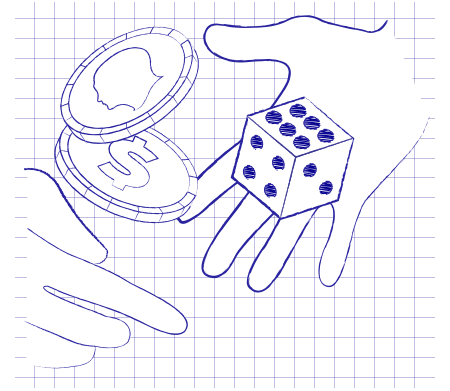
1. There are 2 outcomes when a coin is tossed; the sample space is
2. There are 6 outcomes when a single dice is rolled; the sample space is <1, 2, 3, 4, 5, 6>.
3. There are 36 outcomes when two dice are rolled (the first dice and the second dice each produce a value from 1 to 6, so there are 6 × 6 = 36 outcomes). The sample space is <[1,1], [1,2], [1,3], [1,4], [1,5], [1,6], [2,1], … and so on>, or more simply, using set builder notation, it is <[x,y] | 1 ≤ x ≤ 6 , 1 ≤ y ≤ 6 >.
4. There are 38 outcomes when a roulette wheel is spun. The sample space consists of the numbers 1 through 36, together with zero and double-zero.
5. There are 52 ways a single card can be dealt from a deck. The sample space consists of the set of card values (rank and suit).
6. There are 1,326 two-card starting hands in texas hold’ em. The sample space consists of the set of pairs of cards.
Many experiments have a sample space that is easily understood from the nature of the experiment but may not be explicitly described. Sample spaces are often very large for casino games, reflecting the intuitive feeling that there are too many things that can happen to count them all. Mathematicians have to count them all.
* there are 66,300 ways a player can be dealt two cards against a dealer up-card in single deck blackjack.
* there are 2,598,960 ways that 5 cards can be dealt to a player in poker.
* there are 407,170,400 ways that the player and dealer can be dealt their respective three cards hands in three card poker.
* there are 55,627,620,048,000 ways two players can play out a hand of texas hold’ em, including their initial two cards, the three flop cards, the turn and the river, playing head’s up against each other.
An “event” consists of some of the things that can happen in the experiment. An event is a way of describing some of the things out of everything that might happen in a game. Here are some examples of events that correspond to some of the games in the list above:
* tossing a coin and getting heads.
* rolling two dice and getting a sum of 7.
* being dealt a blackjack against a dealer up-card of an ace.
* being dealt a pat full house as a five card poker hand.
* being dealt a straight that loses to a higher straight in three card poker.
* being dealt a pocket pair in texas hold’em.
To compute the probability of an event we need to know two pieces of information. First, we need a full count of the number of individual elements in the sample space. Second, we need to know how many individual elements are in the collection that corresponds to the event. Simply put, we need to know the size of the sample space and the size of the event.
KNOWING THESE VALUES, WE DEFINE THE PROBABILITY OF THE EVENT BY THE EQUATION:

The word “probability” is cumbersome to write out; it is customary to use the letter “P” when referring to the probability of an event.
What is not evident by the equation for probability is how to count the size of various collections. Unfortunately, in gaming there are very few simple problems and these counting problems can be exceedingly complex. For those cases when counting is easy, probabilities can be quickly computed. We’ll go through several examples to demonstrate some of the techniques. Hopefully these examples will help clarify the concept of probability for casino games and some of the methods that are used to come up with these values.
TOSSING A COIN PROBABILITY
When tossing a coin, let H = “heads” and T = “tailes.” for a single coin toss, the sample space is
TEXAS HOLD’EM PROBABILITIES
FIRST & SECOND DEALING CARDS
In texas hold’em, there are 52 possible first cards you can be dealt and 51 possible second cards you can be dealt. Because the order of the cards doesn’t matter, we divide by 2 to take account of symmetry. The size of the sample space is:
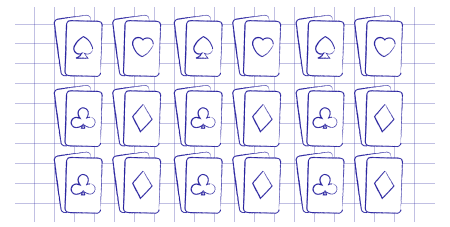
POCKET PAIR
We consider the event of being dealt a pair. If we look at pairs of deuces, there are six possible pairs (again, order doesn’t matter): <[2C,2D], [2C,2H], [2C,2S], [2D,2H], [2D,2S], [2H,2S]>. For any rank of card, there are six possible pairs of that rank. There are 13 possible ranks for the pair, and six ways of making the pair at that rank. This gives 13 × 6 = 78 pairs. So, the size of the event of being dealt a pocket pair is 13 × 6 = 78. So:
P(pocket pair) = 78 / 1326 = 0.0588.
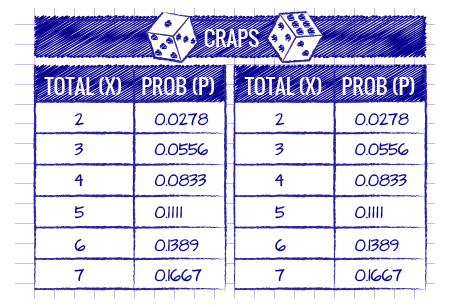
ROLLING DICE PROBABILITY
When rolling two dice, the sample space is <[x,y] | 1 ≤ x ≤ 6 , 1 ≤ y ≤ 6 >; the sample space has 36 elements in it. The event “getting a sum of 7” corresponds to the subset of the sample space <[1,6], [2,5], [3,4], [4,3], [5,2], [6,1]>. This subset has 6 elements in it. Therefore:
This figure gives the probabilities for the various sums of two dice:
BLACKJACK VS. DEALER ACE PROBABILITY
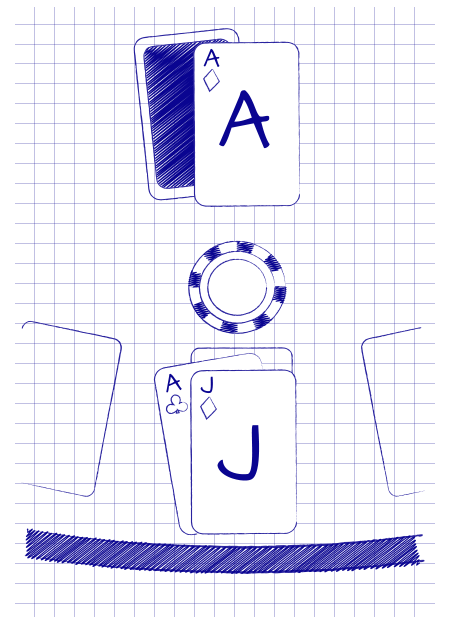
In single deck blackjack, there are (52 × 51) / 2 = 1,326 possible two card starting hands for the player. For each such hand, there are 50 cards left in the deck that can be dealt as the up-card for the dealer. Thus there are 1,326 × 50 = 66,300 possible starting situations. So the sample space has size 66,300. The event we’re interested in is being dealt a blackjack against a dealer ace. A player blackjack consists of a face card (16 of them) and an ace (4 of them). There are 16 × 4 = 64 ways for the player to be dealt a blackjack. There are 3 remaining aces out of 50 cards for the dealer up-card. So there are 16 × 4 × 3 = 192 ways for the player to have a blackjack against a dealer up-card of an ace. The event of a player blackjack against a dealer ace has size 192. Therefore:
P(blackjack vs. Dealer ace) = 192 / 66,300 = 0.002896.
This means that the situation where a player can consider taking “even money” comes up about 29 times in every 10,000 hands, or about once every 345 hands. At a full table and at standard dealing speeds, this amounts to about one player “even money” decision per table per hour in single deck.
Doing the same computations for a six-deck shoe game, we get a sample space with size 15,039,960 and an event with size 52,992, so that:
P(blackjack vs. Dealer ace) = 52,992 / 15,039,960 = 0.003523.
This means that even money situations come up about 35 times per 10,000 hands, or about once every 284 hands. Even money is far more common, and therefore potentially far more profitable for the casino, in a shoe game.
THREE CARD PROBABILITIES
In this example we are going to go through the mathematical details of the pair plus bet in three card poker and compute all the probabilities.
First of all, the sample space consists of all the distinct three card hands that can be dealt from a deck of 52 playing cards. There are 52 possible values for the first card, 51 possible values for the second card, and 50 possible values for the third card. Three cards can be rearranged in six possible ways, but still be the same three cards: ABC, ACB, BAC, BCA, CAB and CBA. Therefore, the number of distinct three card hands is:
EVENT: STRAIGHT FLUSH
These are easy to count. In order to have a straight, we have to get one of the hands A23, 234, 345, 456, 567, 678, 789, 89T, 9TJ, TJQ, JQK, QKA in one of the four suits. There are 12 straights and each straight can happen in one of the four suits, so there are 12 × 4 = 48 ways to get a straight flush. So:
P(straight flush) = 48 / 22,100 = 0.002172
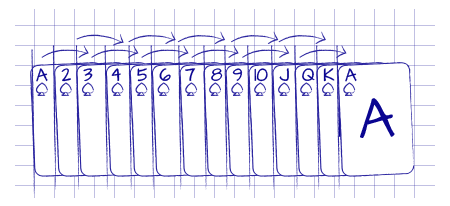
EVENT: THREE OF A KIND
Again, we can count these directly. For deuces, we can get trips with any of the hands [2C,2D,2H], [2C,2D,2S], [2C,2H,2S] and [2D,2H,2S]. There are four trips for any rank and there are thirteen ranks, so there are 13 × 4 = 52 ways to get three of a kind. So:
P(three of a kind) = 52 / 22,100 = 0.002353.
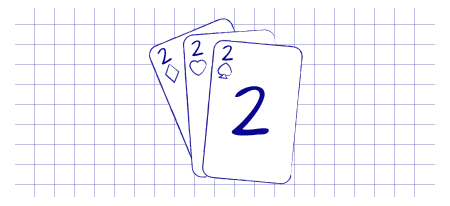
EVENT: STRAIGHT (NOT STRAIGHT FLUSH)
We begin by counting all straights, including the straight flushes. As above, a straight consists of one of the hand types A23, 234, 345, 456, 567, 678, 789, 89T, 9TJ, TJQ, JQK, QKA. Let’s look at A23 in particular. We can have any suits for the A, 2 and 3; there are four choices for the suit of each (clubs, diamonds, hearts and spades). Therefore the A23 straight consists of picking a card from each of
P(straight) = 720 / 22,100 = 0.032579.
EVENT: FLUSH (NOT STRAIGHT FLUSH)
We need to count all the hands XYZ where X, Y and Z have the same suit and the hand is not a straight flush. We’ll pick on the suit clubs. There are 13 cards. We can choose any of these 13 for the first card, any of the remaining 12 for the second card, and any of the remaining 11 for the third card. Because three cards can be rearranged in six possible ways and the order the cards were dealt doesn’t matter, it follows that the number of ways of getting a flush in clubs is (13 × 12 × 11) / 6 = 286. Of these flushes, 12 of them are a straight flush. This leaves 286 – 12 = 274 flushes in clubs that aren’t straight flushes. Because there are four suits, it follows that the total number of flushes is 274 × 4 = 1,096. So:
P(flush) = 1,096 / 22,100 = 0.049593
EVENT: PAIR.
There are 6 ways of getting a pair of any rank. For example, to get a pair of deuces the player must hold one of the pairs [2C,2D], [2C,2H], [2C,2S], [2D,2H], [2D,2S] or [2H,2S]. Once the pair is dealt, the third card has to be a card of a different rank (otherwise the hand would be trips). There are 48 cards that are not the same rank as the pair. Putting this together, there are 13 possible ranks for the pair, 6 pairs of that rank, and 48 possible third cards of a different rank. Multiplying these together, we get a total of 13 × 6 × 48 = 3,744 pairs. So:
P(pair) = 3,744 / 22,100 = 0.169412.
EVENT: NOTHING
This final case is the easiest. To get nothing simply means that the hand isn’t any of the above. We simply subtract all of the results above from the total number of hands. This gives 22,100 – 48 – 52 – 720 – 1,096 – 3,744 = 16,440 hands that are losing hands for the pair plus wager. So:
P(nothing) = 16,440 / 22,100 = 0.743891.
HIT FREQUENCY
We now illustrate how to compute the hit frequency. For the pair plus wager, a player wins any time he has a pair or better. The hit frequency corresponds to the probability of being dealt a pair or better. To find the number of elements in this event, we simply add up all the possible winning hands. Doing this, we get 48 + 52 + 720 + 1,096 + 3,744 = 5,660. So:
Hit frequency = P(winning) = 5,660 / 22,100 = 0.256109.
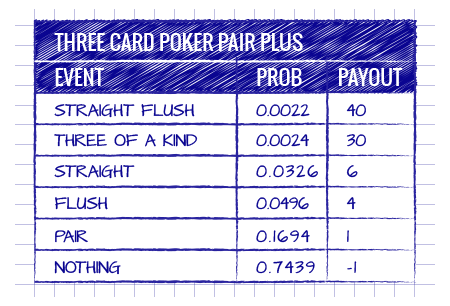
It follows that the hit frequency is 1-in-3.9. Rounding off, the player wins about once every four times he makes a pair plus wager.
Finally, note that if we add all the probabilities together, we get 0.002172 + 0.002353 + 0.032579 + 0.049593 + 0.169412 + 0.743891 = 1.000000. This simply means that the probability that something is going to happen is 1, a certainty.
The following figure summarizes the probabilities we just computed and the payouts for the various events using the most generous pay table shuffle master offers for this wager. It is customary to indicate a payout of -1 when the player loses; after all, he lost his wager. In all other cases, the player’s wager is returned and he is paid the amount indicated in the table.
What casino game uses dice
M ore money is gambled on craps than any other game in the world, making it the biggest gambling game in history.
The dice game craps offers the best odds in an online casino or a brick and mortar casino, but only if you make the right bets. It is also the most exciting casino game with the fastest action and the most noise with players shouting, chanting and cheering once the dice are on a hot roll.
The version found in most casinos is known as bank craps. If you're going to play bank craps with real money then read gambling guidelines first and get some sound advice. You may also want to read about odds and find out some interesting facts about mathematical probability with dice.
Now, read on and learn how to play, craps superstitions, the winning systems, the true odds, which bets not to make, and everything else you need to know to become a pro.
The craps table can be a daunting and confusing place for the newcomer. So many betting spaces on a complex layout, played at a breakneck pace and with a language all of its own. Don't be put off, the basic game is quite simple.
If you just want to get started, read basic craps and if you're new in a casino you should read about casino craps procedure .
Once you've mastered the basics and you want to know more, here are two complete sets of craps playing instructions for you to choose from - instructions from a real casino and dice-play's own craps guide .
If it's your first time at a casino craps table there is a certain craps etiquette or protoco l that you should learn if you want to act like a natural. New players may also like to acquaint themselves with some craps superstitions that may have a bearing on how you're viewed at the table.
If you play craps seriously then you should know about craps odds and which bets offer the best percentage and which are for suckers.
Sooner or later you're going to come across someone with a winning system. For more details and for FREE instructions read about craps systems .
If you want some sound advice on craps betting then read good craps play for a guide.
Many players claim and try to control the outcome of the dice when shooting. If you want to learn more, see dice setting , and rhythm rolling, controlled shooting .
Brick and mortar casinos offer "comps" (complimentary services) to their customers as a reward for playing with them. For more details on these FREE extras, see casino craps comps.
And here are some craps hustles that unscrupulous players try to pull off. For descriptions of outright cheating methods, see casino craps cheating.
Playing online casino craps.
You can play craps online and you don't even have to play with real money. Many online casinos let you play with imaginary FREE money so you can get a handle on the games.
If you want to play with an online casino, read getting started for information and advice on how to go about it.
Security shouldn't be an issue because online casinos use powerful encryption techniques for data transfer. These methods are used by all the worlds top banks and financial institutions. However, you shouldn't play with any online casino. For advice on how to choose an online casino, check selecting legit' online casinos.
You should get a bonus when signing up with an online casino. This is FREE money but you should check online casino bonuses first to learn about the terms and conditions attached.
For some information on how online casinos operate, see an inside look at online casino craps.
If you want to learn about the origins of the game, then read the history of craps and hazard for details .
You can play private craps anywhere without the casino and table. It may help your game if you were to play socially.
A number of craps variations have been developed, said to make the game simpler. You may come across them in some casinos who may give you the line that the odds are better than standard bank craps. Don't believe it. Gimmicks on casino games are always used to give the casino a better edge.
To learn about the special dice used by casinos for playing craps, read about perfect or precision dice .
And if you're bored with craps then see casino and gambling dice games for more ways to win or lose your money.
Miami dice casino
The site looks tremendous with crisp-white, grey, pink and teal tones blending into a sunset silhouetted miami skyline, complete with palm trees. The layout is clean and functional with all the important sections like ‘support’, ‘games’, ‘registration’, ‘promotions’ and ‘VIP’ clearly marked and easy to find. The neutral white background cleverly serves to emphasize the bright and colourful gaming titles. Convenient search features ensure players an easy time of finding their favourite casino games, whilst an instant chat feature hovers unobtrusively to the right of the screen giving players instant easy access to support at the click of a button. The impression overall is a tasteful welcome to an exciting and dynamic casino experience.
All the major sections of the casino can be instantly accessed by interacting with the category menu column that runs from top to bottom on the left-hand side of the screen. Across the top of the casino, just below the main heading banner is another action bar that allows players to search and filter results so that they have control over the type and number of games that appear in the main area of the page. Registration and support buttons are available on the right-hand side of the page and both scroll and hover with the page view so that players can always access these features. The layout works well because it is efficient and clearly laid out which makes navigating the online casino more of an intuitive task than a test of one’s knowledge.


– good welcome bonus
– exceptional mobile casino
– great live casino
– large game portfolio from 18 developers!

– no phone support
– no exclusive games
– no pay by phone option
On the weak side, all withdrawal requests are set to pending status for 48 hours and are only then processed for transfer, which may take an additional period to be verified for release. Typically transfer of funds to player nominated accounts take 5 business days or more – this is quite a bit longer than the online casino industry average. Furthermore, miami dice has yet to implement a pay by phone option for easy mobile transfers and maybe some exclusive games that will make it stand out from the rest. We would also like to see phone support to be available any time soon.
Similar new casinos




Miami dice mobile casino
Miami dice offers an easy-to-use mobile casino in the case you want to enjoy the online casino games on the go. The mobile platform is really interactive, as you will find all the casino features hassle-free. The menu bar is situated on the left side of the screen where you will find the games lobby, the promotions, the VIP, the contact and the live chat function. The main interface displays the welcome bonus in a funky backdrop like the one of the desktop while the ‘sign up’ option is more than evident and the sing-up form is really easy to see and fill out.
All the mobile casino games are presented in the main menu while you can filter them by their category, popularity or provider. There are more than 300 online slots and casino games to choose from the main game categories like online slots, table games, jackpot, fun and bingo. On the downside, we are missing the live dealer casino that is available on the desktop version. Overall, the mobile casino runs smoothly on operating systems like the ios and the android and it looks great on any screen size.
Miami dice casino welcome bonus package
Miami dice on first deposit bonus offer of 100% up to £300 plus 50 bonus spins. Miami dice also offers two additional bonuses on all players’ second and third deposits – each deposit bonus listed here has a wagering requirement of 35 times.
Welcome bonus package
First deposit:
bonus: 100%
maximum amount: £300
plus 50 bonus spins on starburst.
Second deposit:
bonus: 50%
maximum amount: £500
plus 100 bonus spins on gonzo’s quest
Third deposit:
bonus: 75%
maximum amount: £500
plus 50 bonus spins on aloha: cluster pays
How to register at miami dice casino
The registration process consists of 3 steps if you register through the regular web casino and only 1 step if do that through any mobile device. In both cases the details needed to fill out are the same, takes less than 2 minutes, and the great thing is that you do not have to fill out any “payment information”, like credit card details.
The online casino journey at miami dice starts the moment you click right here. This link will take you to the casino’s main web page where the welcome bonus for new online players is shown right upfront. Right below that you can see the yellow ‘sign up now’ button that calls for a quick registration. You can also select the ‘register’ button which is located on the right side of the website. The registration form pops out asking for some standard “personal information” in the first step. After you fill in your full name, your email address, the gender and the date of birth you can proceed to the next step that requires your “contact information”. Your home address, your city or town of residence, your postcode and your mobile phone number are required fields.
The third and last step is about your “account information”. Choose a username and a password that you ‘d like to use and tick the box confirming that you are over 18 years of age. That is all, press the finish button and you are now a confirmed customer at miami dice. You can claim your welcome bonus instantly as there will be no messages that will ask for account verification. Please have also a look at our “how to register at miami dice” video, can be found on our sidebar, for additional information.
Miami dice casino other rewards and promotions

Furthermore, you have the unique opportunity to enter prize specific promotions where you could win tangible products such as the latest model cars based on your accumulation of miami points, which is synonymous with what the casino’s VIP loyalty program is based on. To get more specific, you can take part in the destination – miami promotion, where 1000 points will get you into the draw for the big prize: holidays in miami.
You can also participate in the winter in miami giveaway and get the chance to win awesome prizes like a holiday of your choice, cash money or other high-tech gadgets. Miami dice loyalty points accrue based on each wager you place at the casino, resulting in cash outs in bonus values when you’ve collected enough points.
Online slots and casino games at miami dice

The house provides for no less than 18 different general tables titles like texas hold ‘em, baccarat, punto banco, caribbean stud and pontoon. There are an astonishing 22 different varieties of blackjack and 11 different roulette options. The live casino option games are currently restricted to two versions of roulette (automatic and standard) as well as two versions of blackjack (common draw and standard multi-deck). Overall miami dice offers an extremely impressive array of top gaming titles in all gaming class categories.
The casino game developers that power miami dice
Miami dice makes use of no less than 18 software developers for providing them with online slots and casino games. That is really exceptional, a very few other online casinos are near that number. Among them, you will found the biggest names, like netent, but also some uprising developers. The full list of hosted software providers is as follows: 1×2 gaming, 2by2 games, amaya, blueprint, ELK studios, ezugi, felt games, games warehouse, genesis, leander, lightning box, microgaming, multi commerce, netent, aristocrat, NYX, quickspin, thunderkick and WHG.
Play online casino games at casino.Com UK
Table of contents:
There’s no better way to play casino games for real money than at the online casino, and there’s no better online casino in the UK than casino.Com. Whether you’re at home or on your mobile device, it’s a convenient, secure, and fun way to gamble. We have all the latest and most popular casino games from top gaming developers such as playtech, netent, microgaming, and more.
All games are tested by a third-party testing facility to make sure that the results are fair and the RNG algorithm is accurate. With a wide range of over 700 casino games, casino.Com is the ultimate destination for UK punters looking to play real money casino.
How to play casino games online
Before you can start playing, you will need to create an online casino account. It’s a quick process, click on the JOIN button at the top of the page to open the registration page. All you need to get started is your name, date of birth, email address, physical address, and phone number. The next step is to transfer funds to your account. Casino.Com UK accepts a wide range of secure payment methods, that can safely deposit the money directly to your account.
After the account is ready, you will have unlimited access to the casino game lobby. Here you will be able to search for games by category, name, jackpot, software provider, or just from A-Z.
In addition to online casino games, casino.Com UK, through the playtech eurolive platform, offers a wide selection of live dealer games. While these two types of casino games have many similarities, such as odds, payouts, and rules, there are some key differences.
| Online casino games | live dealer games |
| uses a random number generator to determine the outcome of a game. | Games use real cards or roulette wheels. |
| The game is completely online | HD streaming cameras bring real-time action from casino to your computer, phone, or tablet. |
| Can play at your pace | have to have your bet in before the timer reaches “0” |
| play by yourself, against a computerized dealer or roulette wheel | can play with punters from around the world and chat with the dealer or croupier |
| game is always available when you want to play | while the live casino is open 24/7, you may have to wait for a dealer to come back from break, for a seat to open at the table, or find a different table. |
What are the best online casino games?
One of the great things about casino.Com UK is we won’t tell you what the best casino games are. Instead, we have a wide range, from the popular table games such as online roulette, blackjack, baccarat to hundreds of online slot games, scratch cards, online craps and so much more. We’ll leave it up to you to play them and decide which you think are the best.
Blackjack – one thing that makes online blackjack even better than regular blackjack is the variants that are only available online. The base game is usually the same, make a bet and then you’ll receive a pair of cards. Then you have to beat the dealer at a game of 21.
However, many of the blackjack tables have different variants that put a different spin on the game.
If you prefer a game with a real deck of cards, check out the many live dealer blackjack rooms. You’ll be able to play at the table with punters from around the world and watch as the dealer passes the cards around the table.
Roulette – there are dozens of online roulette tables at the casino game lobby. With european, american, and french roulette wheels, there is something for everyone. In addition to the standard roulette wheel with 36 red and black numbers, you can spin the mini roulette (12 numbers) or 101 roulette (101 number) wheels. There are also several online roulette games with a progressive jackpot.
If you’re wary of an automated roulette table, come to the live casino and check out our many live roulette tables and watch in real-time as the croupier drops the roulette ball on the wheel.
Slots – there are so many online slot games it’s hard to fit it all in a short paragraph. From one-armed bandit style slot machines to games that have over 116,000 paylines we’re confident you’ll find multiple slot games to play. There are sports, destinations, superheroes, fantasy, fruit, and TV/movie themes games. There are also slot games with progressive jackpots and fixed jackpots, with tons of possible bonus features.
Live casino – casino.Com uses the playtech eurolive platform to bring live dealer blackjack, roulette, and baccarat to our UK punters 24/7. The casino is in latvia, and has hundreds of HD streaming cameras that bring the action directly to both computers and mobile devices.
Video poker – try your luck in both single-line and multi-line video poker games
Baccarat – baccarat may have the reputation as the “game of kings,” but this is really a simple game to learn and play. You can find both commission and non-commission baccarat tables. Live baccarat is available at the live dealer casino.
Craps – perhaps no casino game is as exciting as craps, and you can make all the bets from the convenience of home.
Safe and secure
Safety is one of the top concerns for any online company that has private user data, and casino.Com UK is no exception. We take every possible step to ensure that our punter’s data and money are protected. It should go without saying that we won’t share or sell any user data to third-party marketers. We have a detailed privacy policy that outlines what information we do collect and what we do with it.
Along with software developers like playtech, netent, microgaming, blueprint among others, we are regulated by multiple gaming commissions, including in the UK, to make sure that our systems are secure and the games are paying out fairly.
Software
Casino.Com believes that to be the best, we have to work with the best. You can find games from playtech, netent, microgaming, realistic, and many others. While the games have their own styles, graphics and features the overall look and feel of the games are uniforms. Every game has the highest quality graphics, is optimized to work on mobile, and a detailed help menu.
As long as you have a stable and fast internet connection, you should experience smooth gameplay, without lagging, and excellent animations that almost make you forget you’re not looking at real cards or roulette wheels.
Mobile experience
As convenient as it is to play at the online casino, playing on your mobile takes that convenience to a whole new level. Take our entire collection of casino games with you while you’re away from the computers. The games are fully responsive and will adapt to all screen sizes, regardless of size. Enjoy the touch-friendly games wherever you are, as long as you have a stable network or wifi connection.
Promotions and bonuses
With your first deposit, you instantly become eligible for the casino.Com UK welcome package. The promotions will continue as we are constantly offering different promotions. They can be tailored to a specific game, holiday, or time of the year. The promotions are a great way to get introduced to new games or just enjoy some of your favourites with the bonus coins. The offers are always changing, so make sure to check out the promotion page for all the latest offers.
Where do I register to start playing casino? Click on the JOIN button on the top of the page and enter your details in the proper fields to register your account.
What is a welcome package? It’s our way of welcoming you to the casino.Com family. The details always change, but it usually includes matching funds up to a certain number. Check out the bonus page for all the different types of bonuses and wagering requirements.
How do I get into the VIP program? There are many perks to being a VIP, so this isn’t just something that we give away. You can join the casinoclub and start earning your way to VIP status. You will also have to deposit and play with a set amount of money. For more information, check out the VIP page today.
How do I know if a casino is safe? Check out the fine print. Don’t trust your money with an unregulated online casino, or one that isn’t licensed by a recognizable gambling commission.
Can I play for real money? Of course! To win real money, you will need to play with real money. Register your account and make a deposit to start playing for real money today.
Are there withdrawal limits? Yes, but it can vary based on which payment method you use for withdrawals. Check out the payment method page for complete details. VIP players also have higher withdrawal limits than regular punters.
How are live dealer games different? Live dealer games don’t use an RNG to determine the outcome of the game. Instead, you’re playing with a real deck of cards or a roulette ball in a casino in latvia and watching the action in real-time.
What are RNG, and why do they matter? This stands for random number generator. It is an algorithm that is used in our online casino games to ensure that the odds of winning are consistent with the odds of winning with a real deck of cards or a roulette wheel. It’s important that RNG is there to ensure fair play so our players know that if they make a bet with a 25% odds of winning, then the actual odds are 25% as well.
I don’t know you, what can you tell me about you? Casino.Com is part of the mansion LTD family of online casinos. We have been operating for over a decade, and took home the award for online casino operator of the year at the 2018 IGA awards.
Are you regulated? Yes, casino.Com is regulated by the gibraltar gambling commissioner and in the UK under the united kingdom gambling commission remote operation license.
Play casino games for real money
Casino games are very easy to learn, and if you have any questions, every game, regardless of the software developer, has a detailed help menu. Register your account today and enjoy unlimited access to both the live dealer and traditional online casino games. Whether you a new punter or an experienced gambler, make sure to check out the welcome bonus packages and promotions before playing any of the casino games, who knows what you might find.
Rules for dice & card games
We've collected the rules to many classic dice and card games, and most don't require anything more than a few dice or a deck of cards.
Dice games
A dice game and social activity for large groups.
Number of players: 8 or more
equipment required: six or more 6-sided dice; pencils and paper
A simple but creative dice game of rolling and drawing.
Number of players: 2 or more
equipment required: one 6-sided die and pencil and paper for each player
A fun and challenging dice game with multiple variations and scoring options.
Number of players: best with 3 to 8
equipment required: six 6-sided dice; pencil and paper for keeping score
The object of this little dice game is to win the most number of rounds.
Number of players: 3 or more
equipment required: three 6-sided dice; pencil and paper for scoring
A simple, fast-moving game that anyone can play.
Number of players: 3 or more
equipment required: three 6-sided dice; chips, coins or other items (3 per player)
A game of bluffing and deception.
Number of players: 2 or more
equipment required: five 6-sided dice per player; one dice cup per player
In mafia, you win by being the first player to lose all your dice.
Number of players: best with 3 to 5
equipment required: five 6-sided dice; A stack of chips or counters for each player; pencil and paper for scoring
Pig is a simple dice game which in its basic form is playable with just a single die.
Number of players: 2 to 10
equipment required: one 6-sided die; pencil and paper for scoring
In this simple little dice game, your goal is to roll the best possible poker hand.
Number of players: 2 or more
equipment required: five 6-sided dice
The number seven is often thought to be a lucky number. But in this game, rolling seven is considered a bad thing.
Number of players: 3 or more
equipment required: six 6-sided dice; pencil and paper for scoring
Often used as a drinking game, or even for stakes, this is an easy to play, casual dice game that's good for playing with a larger group.
Number of players: best with at least 4
equipment required: five 6-sided dice
Yahtzee is a classic dice game that uses five 6-sided dice. It’s easy to learn, quick to play, and accommodates any number of players. There’s a reason it’s been so popular for decades!
Number of players: 1 or more
equipment required: five 6-sided dice; score cards
This lively dice game for 2 or more players uses lots of chips and an interesting scoring mechanism.
Number of players: 2 or more
equipment required: three 6-sided dice; 20 chips or counters per player; pencil and paper for scoring
Card games
A classic trick-taking card game that truly shines with 4 players.
Number of players: 3 to 7 (but best with 4)
equipment required: A standard 52-card deck of playing cards; pencil and paper for scoring
A multiplayer game where players attempt to get rid of cards from their hand by playing them to piles of alternating red and black cards.
Number of players: 2 to 6
equipment required: A standard 52-card deck of playing cards
A simple, luck-driven card game.
Number of players: 2
equipment required: A standard 52-card deck of playing cards
9 simple dice games for kids for ultimate FUN

Many people only use dice when playing packaged board games. However, there are some excellent dice games for kids that use only a pair of dice and a piece of paper for score keeping.
Dice games are popular for a number of reasons, among them:
- Dice games are versatile as they can be played with any number of players, on the floor or table, or in the car, and with people of any age.
- Dice games are educational.
- Dice games teach numbers and counting to little kids and mentally adding numbers to older kids.
- Dice games introduce kids to strategic thinking and planning.
- Dice games teach social skills such as taking turns and winning and losing gracefully.
- Dice games are portable as you can always find room for a few dice in the glove box of your car, a handbag, pocket, or backpack.
- Dice are inexpensive because dice are cheap and readily available in old table games and in discount and thrift stores.
- Dice games are fun!
Our collection of dice games for kids includes information about skills developed, just in case you need this information. However, remember that dice games are not usually played to educate, but to have fun!
Dice game tips
Before we show you our collection of dice games for kids, we suggest you read the following tips for ways to utilize your dice, store them, and have some control over the games kids play.
- Collect small containers, such as empty spice bottles and pill bottles, and any small plastic food containers with lids for storing dice.
- Use plastic cups and coffee mugs to shake and throw dice.
- Use a piece of felt to cover the playing surface to decrease the noise level during dice games.
- Create individual dice games for traveling or a classroom by placing dice and directions in re-sealable plastic bags or small, lidded containers.
For all of our dice games for kids, you will need pencil and paper for keeping score, a shaker for the dice, and a flat surface.
“knock out” dice game for kids
“knock out” is a very simple game, using just two dice. As soon as a child can recognize their written numbers, they can play this game.
Skills learned: adding
Dice needed: 2
Object of the game: to avoid throwing certain scores and being knocked out of the game.
Directions for play:
- Each player chooses a “knock out number” – either 6, 7, 8, or 9. More than one player can choose the same number.
- Players take turns throwing both dice, once each turn. Add the number of both dice for the score.
- If a player throws a 6, 7, or 8, they are knocked out of the game until the next round.
Decide before the game a score to be reached for a win.
“beat that!” dice game

A good game for introducing your kids to the fun of dice games, this easy-to-learn game is one that is very popular with kids. It is sure to become a family favorite!
Skills learned: number recognition, place value, and strategic thinking.
Dice needed: 2 for younger players and 7 for older players
Directions for play: each player takes a turn rolling the dice and placing them in order to make the highest number possible. For example, if a player throws a two and a three, they have 23. A player who throws a six and a four would win the round as they have the higher number. After each throw, a player challenges the next player, “beat that!” play this game in rounds, assigning a winner to each round.
- Try making the smallest number possible.
- Use three dice for play.
- Instead of playing in rounds, set a score, such as 500, players must reach to win the game.
“catch up” dice game
”catch up” is a great game for groups of children as you need at least four and up to eight kids to play. If you have more than eight kids, split them into groups of four to eight players. Large families and teachers will find this game effective. You will need counters or small toys for each child.
Skills learned: playing patiently, rhythm and chanting
Dice needed: 2
Object of the game: to be the first player to win three counters.
Directions for play:
- Players sit in a circle around a table or on the floor with the oldest and the youngest players across from one another.
- Divide the dice so that these two players each have one. Put the counters in the middle of the circle.
- The children without the dice create a rhythm by first slapping their knees (or the table) once and then clapping their hands once. Then the children begin chanting:
Note: the chant is marked with / showing every two beats.
Are you/ready? /are you/ready?
Roll now!/slap clap!/what have you got?/slap clap!
Must you pass?/slap clap!/hope not!/slap clap!
- The chant is repeated as play continues.
- Begin the play with the command, “roll now!”
- The players roll the dice, hoping for anything but a six. If it is six, players must pass the die to the player on their left and take up the chant.
A child wins the round when he is still in possession of a die and receives another from the player on his right. The winner of the round collects a counter and the first to collect 3 counters wins.
- For older children, increase the speed of the chant.
- For groups of 6 or 8 players, you may wish to increase the passing roll to two numbers – say a 5 and a 6, as this speeds the game up quite considerably.
“going to boston” dice game

A well-known and easy to learn dice game, “going to boston “gives children plenty of adding practice.
Skill learned: adding
Dice needed: 3
Directions for play:
- Roll the dice and keep the highest.
- Roll the remaining dice and again set aside the highest.
- Roll the last die, and add up your total. Write down your score.
If a player roils the highest total for a round, they win the round. Keep score and the player who wins the most turns wins the game.
Suggested variations:
- Keep totaling each player’s score and the player who reaches 500 points first wins.
- Substitute specialty dice with higher numbers.
- Have older children multiply the dice to get their score.
- Use more than three dice.
“run for it!” dice game
Here is a very simple game of sequences or runs.
Skills learned: recognizing numbers and sequences, early strategic thinking, and counting by in five
Dice needed: 6
Directions for play:
Each player takes a turn rolling the dice and looking for runs starting with (1-2, 1-2-3, and so on). Each dice part of the run scores five points. A player can only have one run in each roll. The first who reaches 100 points is the winner.
Examples of play:
Player throws six dice and gets the numbers 1, 4, 2, 1, 3, and 2. The following sequences can be scored: 1, 2 (10 points) or 1, 2, 3, 4 (20 points). The hand is worth 30 points.
Player throws six dice and gets the numbers 1, 4, 6, 6, 3, 3. No sequences can be formed, so no score is recorded.
- For older children, substitute specialty dice with higher numbers
- Have players multiply the dice to get their score.
“stuck in the mud!” dice game

The fun of this dice game is the unpredictability. Some turns end immediately and some seem to go on forever. Players can only score on a roll which does not include the numbers 2 and 5. Any dice, which show a 2 or a 5, become “stuck in the mud!”
Skills learned: addition – mental and scoring
Dice needed: 5
Object of the game: to achieve the highest score
Directions for play:
- The first player rolls all five dice. If any 2s or 5s are rolled, no points are scored for this throw. If no 2s or 5s are rolled, add up the total of the dice and write it down.
- The player sets aside any 2s and 5s, and throws the remaining dice. Again, if any 2s or 5s are thrown, no points are scored. If there are no 2’s or 5s, add the total to the previous score.
- Continue in this way until all the dice are “stuck in the mud.” after the score is totaled, play passes to the left.
Agree a number of rounds – five works well – and total up the score.
“three or more” dice game
This dice game is simple and fun, which means it is popular.
Skill learned: adding
Dice needed: 5
Object of the game: to get the highest score
Directions for play:
Players take turns rolling all five dice and scoring for three-of-a-kind or better. If a player only has two-of-a-kind, they may re-throw the remaining dice in an attempt to improve the matching dice values. If no matching numbers are rolled, a player scores 0.
- 3-of-a-kind: 3 points
- 4-of-a-kind: 6 points
- 5-of-a-kind: 12 points
Set the number of rounds for the game and the player with the highest total score at the end of a game is the winner.
Suggested variations:
- Substitute specialty dice with higher numbers.
- For older children, have them try multiplying the dice together to get their score.
“round the clock” dice game

This easy game works well for young children as soon as they can recognize the number of spots on dice and count to twelve.
Skill learned: addition
Dice needed: 2
Object of the game: to be the first player to throw all the numbers from 1 to 12 in order
Directions for play:
- Choose the first player with a dice throw; the player with the lowest total going first.
- The first player throws both dice, hoping to throw a 1. Players then take turns (in a clockwise direction) trying to throw a 1.
- On the next round, those players who threw throw a 1 will try to throw a 2. Any player who did not throw a 1 in the first round will try again this round. Players can do so by throwing a 2 or two 1s.
- Play continues round-by-round with players trying to throw all the numbers from 1 to 12 in sequence. Players may count the spots on just one die or on both dice added together. For example, throwing a 3 and a 6 could be counted as 3, 6, or 9.
- The first player to go “round the clock” – throw all the numbers from 1 to 12 in order – wins the game.
Variation: A player can keep throwing the dice during their turn until they fail to get the number for which they are trying.
“pig” dice game for kids
Even though the directions make this game sound easy, unless you are good at throwing 1s, this game may be hard for to play. The game is called “pig” because the first player “hogs” the dice in an effort to win the game.
Dice needed: 1
Object of the game: to score 100 points or more
Directions for play:
- Have the players throw the die to determine order of play. The lowest roll goes first.
- The first player rolls the die and adds up the numbers after each roll. They may stop rolling at any time and end the turn
- The player loses all points for the turn when a 1 is rolled.
- If the first player gets to 100 points on their first turn, the other player(s) may take their turn to try to achieve a better score.
Dice games provide fun for everyone, from very young children to the elderly. Additionally, some families enjoy collecting dice, which can be found in old table games at garage sales, at discount stores, and in educational supply catalogues. Try all of our dice games for kids and have fun!
5 dice game rules


How to score in farkle
Dice games are convenient, inexpensive and educational. Playing dice games as a family can reinforce important math skills your child is learning at school, while also teaching your child about fair play and appropriate socialization. Dice games can be adapted for a variety of skills and ages, and have been popular for at least 5,000 years. These games all require five dice, but could be modifed to use less dice for younger players.
Beat that
Play "beat that" to reinforce upper elementary place value concepts and ordering numbers. Roll five dice to create the largest possible number. For example, a roll of 1, 2, 3, 4 and 5 would allow a top score of 54,321. Keep track of your large number while your partners try to beat it. For the best educational benefit, write your large number in words or say it aloud. For a challenge, use more than five dice.
Run for it
Play "run for it" to practice sequential numbers and the five times table. Roll five dice at once and look for runs beginning with one. You earn five points for each die that is part of a run. For example, a run of 1-2-3 has three numbers in sequence, and is worth 15 points. You may find more than one run in each roll of the dice. The first player to 100 points wins the round. For a challenge, use more than five dice, or assign a different point value to practice other multiplication facts.
Dice-1000
Dice-1000 game involves mental math and probability skills. Begin by rolling five dice at once. Collect 100 points for each roll of one and 50 points for each roll of five. If you throw three matching dice, multiply that number by 100 to calculate the point value (a set of three fours would be worth 400 points). You can roll as many times as you like, but if subsequent rolls result in zero points, you lose your entire score for that round. If your first throw is worth zero points, you lose all points for the game. The winner is the first to collect 1,000 points.
Stuck in the mud
Stuck in the mud also involves probability and mental addition. Begin by rolling all five dice at once. Add the point value of all five dice unless you rolled any twos or fives, in which case your throw is worth zero. Pick up all remaining dice that`are not twos or fives (those dice are "stuck in the mud") and roll again. Keep tallying your points. The next player only gets a turn once all your dice are "stuck in the mud." the winner has the highest score after five rounds.
The 13 most popular dice games
Beetle (aka cooties)
Each player rolls a die and draws a certain part of a bug, depending on the die roll. Certain parts must be drawn before others may be drawn. The first to complete his bug wins.
Roll three dice, scoring the result. No decisions. Widely popular among suburban women in the US.
Chō-han (aka chō-han bakuchi)
Very simple japanese dice game. Six dice are rolled and the results kept secret. Players bet on whether the sum on the dice is odd or even.
Farkle (aka zonk, zilch, 10000, wimp out, greed, squelch)
A “push your luck” game, and the inspiration for can’t stop and other, similar proprietary games.
Roll six dice, banking any that can score (generally any 1, 5, or three of a kind). You can end you turn and score what you have banked, or re-roll the non-banked dice. If you ever roll dice and can’t bank any of them, you lose everything you have banked and pass your turn.
Hazard (aka craps)
Craps is a specific variant of hazard.
Pick a number from 5 to 9 and try to roll it (in craps, the number is 7). If you roll the number you win. If you roll 2, 3, 11, or 12, you may lose, depending on which number you picked. Otherwise, try to roll the same number you just rolled again, before rolling the number that you originally picked.
A proprietary game only 17 years old from george and company LLC.
Three dice have sides with L (left), R (right), and C (center), and three blank faces. Roll the dice, passing chips in the direction indicated; center means the center pot. The last player with chips left wins (and, if playing for money, takes all the chips in the center pot).
Its popularity stems from the fact that even after you have no chips remaining, you may still win if a player to your left or right passes you one before the game ends.
Liar’s dice (aka bluff, dudo, cachito, perudo, mexicali, mexican)
The game of betting on the sum rolled.
Each player rolls a number of dice, looks at his own, and covers them. Players then bet, in turn, on how many dice have how high a face value, with each player having to either call or up the values on his turn. At a call, the calling player wins if the previous player was incorrect; otherwise, the previous player wins.
Not to be confused with the above mexican.
All players roll the dice, with the lowest rolling player tossing the stakes into the pot. Continue until all but one player is eliminated. That player takes the pot.
Pig (aka pass the pig)
A simpler push your luck game than farkle. Roll a single die, banking your roll each time. Pass the die and score what you have banked whenever you want. If you roll a 1, you lose what you have banked and pass the die.
These special dice have faces of 9 through A. Roll the dice, re-rolling any dice up to two times. Player with the highest poker hand wins.
Poker dice are often used to play klondike, which is not related to the card game of the same name. The dealer and players roll, with the players winning if they beat the dealer’s hand.
Sic bo (aka hi lo, grand hazard, chuck-a-luck)
Grand hazard is not related to hazard.
Players bet on the outcome of the dice (similar to roulette), with payouts according to the chances of the roll.
Shut the box
This game often uses a wooden contraption to keep score.
Player roll two dice, marking off any combination of numbers 2-9 (or 10) that add up to the total rolled on the dice. Continue rolling until you cannot mark any unmarked numbers for a given roll. End your turn and score the numbers marked.
Yahtzee (aka yacht, balut, kismet)
Each player has a grid of dice values, each box of which scores a certain number of points. Roll the dice, re-rolling any dice up to two times. Score any box that you want to which the dice correspond, but that you have not already scored. If you cannot match your roll to any box, score a 0 in any unscored box of you choice. The game ends after all boxes are filled, with the highest total score winning.
9 comments
[…] this post was mentioned on twitter by purple pawn, kevin E. Schlabach. Kevin E. Schlabach said: the 13 most popular dice games [purple pawn] http://bit.Ly/25ku3m […]
I think another popular game missing on this list is snakes and ladders
I wouldn’t call snakes and ladders a dice game. There’s a difference between a game that uses dice and a game that’s focused on dice.
Well, in that case I think beetle should not be here either. Isn’t roll and draw is same as roll and move?
Not really. It’s paper and pencil, and the drawing is really just a means of keeping score (marking off the numbers you’ve already rolled). Snakes and ladders is a full board game, where the positions of your pieces on the board provide semiotic significance.
What do you think about zombie dice?
Zombie dice is a variant of farkle or pig, except you collect points on a 6 (or 5 or 4, depending on the die color) and lose after rolling three 1s (or 2s or 3s, depending on the die color). And it’s themed. 13 points to win.
What’s there to think about?
Do you have rules for the game “nickels” dice game?
Sorry, the comment form is closed at this time.
Six dice game rules


Farkel dice game rules
Six dice is a dice game known by many other names, including ten thousand, zilch and farkle. It is a simple game where players try to score by getting certain combinations on the dice. Combinations are worth set points and players try to race to be the first player to earn 10,000 points. Its rules are highly adaptable and simple to understand.
Players roll all six dice during their turn. Decide on the order of play by rolling one die. The person with the highest roll goes first. Players throw the dice and count their score. If they have non-scoring dice left, they can roll these dice again. As long as they keep rolling scoring dice, they can keep rolling. If all six dice can score, players can then throw all six dice again. Players can stop at any point, after scoring in the first time (see special rules) and take their points. If players throw a roll that does not generate new scores, they lose their turn and the points earned in the hand and the next player gets a chance. Play continues until somebody scores 10,000 points.
Scoring
Scoring in six dice can seem complex but there are really only a few specific rules. Each rolled one is worth 100 points while each rolled five is worth 50. Three ones are worth a quick 1,000 points. Three of any other kind takes the dice value and multiples it by 100. For example, three twos would equal 200 points. Players score 3,000 points for rolling a one, two, three, four, five and six in one roll. Three pairs score 1,500 points. All special scoring combinations must be thrown in one roll in order to count. For example, if a player rolls two ones and then rolls another one, he scores 300 points, not 1,000. Likewise, a player who rolls two fives and two ones and then rolls two sixes on the next roll doesn’t score for two pairs, but just for the two fives and the two ones.
Special rules
There are a few special rules players can either add to the basic game play or ignore if they don’t feel like an extra challenge. For example, players who haven’t scored yet must roll at least 500 points in their first scoring attempt. Afterward, they can score as little as 50 per turn. Later on in the game, players may throw scoreless first rolls. If a player does this three times in a row, she loses 1,000 points. When five of the six dice are scoring, some players use the rule that they have two chances to roll the sixth die to score. Scoring with the sixth die gives the chance to roll all the dice again as well as a 500 point bonus. This bonus increases by 500 every time the player repeats this feat in single turn. Some players have a rule where six dice of the same type thrown in a single roll counts as an automatic game win.
Dice sizes explained
Dice are measured in millimeters (mm) from side to side, and while dice can range in size from 5mm all the way up to 100mm or more, there are a few dice sizes that are considered "standard": 5mm, 12mm, 16mm, 19mm, 25mm, and 50mm.
One inch is equvalent to 25.4 millimeters, so a 16mm dice is roughly 2/3 of an inch in size, and a 19mm dice is about 3/4 of an inch.
With all the sizes of dice available, it's sometimes hard to know which size you need. Is a 12mm dice big enough to easily game with? Just how large is a 25mm dice compared to other game components? Take a look below at our examples of all the common dice dimensions to find out.
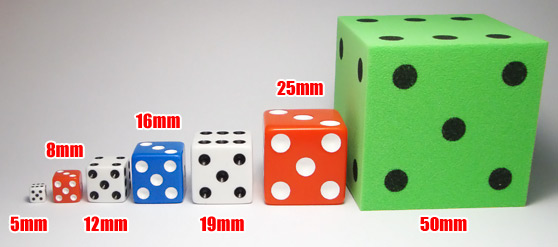
5mm dice (3/16")
These extremely small dice can be used for gaming if you've got limited space for rolling (and good eyesight), but they're even better to use as game markers or to track points or scores on game units or cards. They're also great for creative applications such as crafts, decorations, jewelry, or artwork.
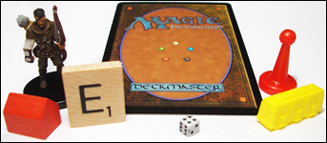
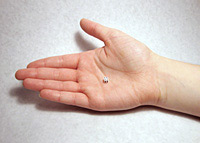
8mm dice (1/3")
At just a third of an inch in size, these dice are very small but still usable for gaming. And the best thing about using 8mm or 12mm dice is that lightweight game pieces won't get knocked askew by any errant tumbling dice.
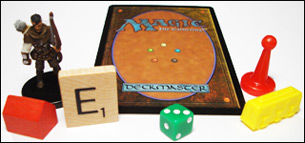
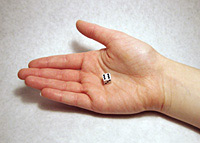
12mm dice (1/2")
These half-inch dice are frequently found in board games (although they are not as common as the 16mm dice). They're good to use when you need to roll many dice at once, since 8-10 will fit comfortably in the palm of your hand.
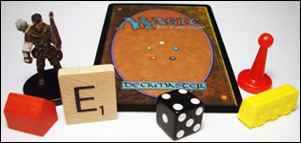
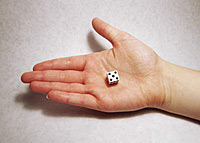
16mm dice (2/3")
The most common size of dice. More colors and styles of dice can be found in this size than in any other. Comfortable in the hand, easy to roll, and very readable, these dice are sized and designed for maximum usability.
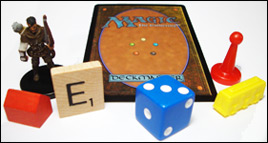
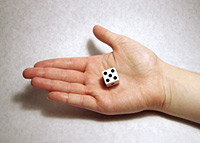
19mm dice (3/4")
Chunkier and a bit heavier than their 16mm siblings, 19mm dice make excellent, easy-to-read game dice, particularly for tabletop games requiring 1 to 3 dice. This is also the size of gaming dice used in casinos.
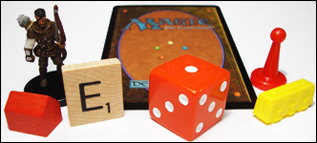
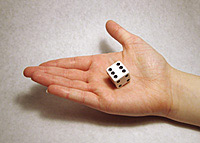
25mm dice (1")
Solid, hefty dice, perfect for party or casino games, classroom use, or decorative purposes. If you need dice that are readable from a few feet away, these do the trick.
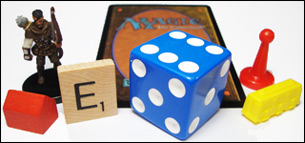
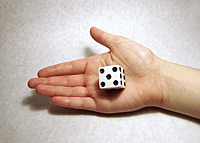
50mm dice (2")
Because of the large size of these dice, they're typically produced in lightweight foam. Sturdy enough to use in a classroom, they're also great for party games. Or you can stack them or adhere them together to create some cool game room decor!
So, let's see, what we have: the backbone of casino game mathematics is “probability.” informally, we understand probability as a number that describes the chance that something will occur. At what casino game uses dice
No comments:
Post a Comment